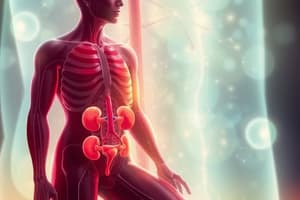Podcast
Questions and Answers
What is the main purpose of selective absorption in the renal tubules?
What is the main purpose of selective absorption in the renal tubules?
- To remove all salts from the body
- To convert glomerular filtrate directly into urine
- To filter out only harmful substances from the blood
- To maintain the normal concentration of blood (correct)
What does the presence of glucose in urine indicate?
What does the presence of glucose in urine indicate?
- Excessive protein intake
- Normal renal function
- High levels of hydration
- Possible diabetes mellitus (correct)
Which of the following is a characteristic of normal urine?
Which of the following is a characteristic of normal urine?
- pH consistently below 5
- Clear yellow color due to urochrome (correct)
- Specific gravity below 1.003
- Volume of 2 litres per day
What is the process called when certain substances are actively transported into the forming urine?
What is the process called when certain substances are actively transported into the forming urine?
Which of the following conditions is termed as albuminuria?
Which of the following conditions is termed as albuminuria?
What is the primary function of the excretory system?
What is the primary function of the excretory system?
Which nitrogenous waste is primarily excreted by the kidneys?
Which nitrogenous waste is primarily excreted by the kidneys?
Which organ is responsible for excreting carbon dioxide?
Which organ is responsible for excreting carbon dioxide?
What structure connects the kidneys to the urinary bladder?
What structure connects the kidneys to the urinary bladder?
What are the two main regions of the kidney identified in its internal structure?
What are the two main regions of the kidney identified in its internal structure?
What are the structural and functional units of the kidney called?
What are the structural and functional units of the kidney called?
How does the blood flow through the glomerulus during ultrafiltration?
How does the blood flow through the glomerulus during ultrafiltration?
Which of the following substances is NOT primarily eliminated by the kidneys?
Which of the following substances is NOT primarily eliminated by the kidneys?
Flashcards are hidden until you start studying
Study Notes
Excretion
- Process of removing chemical wastes, primarily nitrogenous wastes, from the body.
- Critical for maintaining homeostasis (steady state condition) in the body.
Excretory System
- Composed of organs involved in the formation, storage, and elimination of urine.
Substances to be Eliminated
- Carbon Dioxide and Water
- Carbon dioxide eliminated through the lungs.
- Excess water released as sweat.
- Nitrogenous Wastes
- Includes urea, uric acid, and ammonia.
- Urea is mainly excreted through kidneys.
- Excess Salts and Water-Soluble Vitamins
- Common salt (NaCl) and excess B and C vitamins eliminated primarily through kidneys.
Excretory Organs
- Kidneys
- Primary organs for eliminating nitrogenous wastes as urine.
- Skin
- Sweat glands excrete water and sodium chloride.
- Lungs
- Main excretory organ for carbon dioxide.
- Liver
- Detoxifies ammonia, converting it into urea.
Kidneys
- Bean-shaped organs located on either side of the backbone, protected by the last two ribs.
- Ureters connect each kidney to the urinary bladder; the ureter expands into the pelvis of the kidney.
- Urine collects in the urinary bladder, expelled through the urethra during micturition.
- A sphincter muscle controls the bladder opening, relaxing only during urination.
Internal Structure of the Kidneys
- Two primary regions: dark outer cortex and lighter inner medulla.
- Medulla contains conical pyramids with apices known as papillae.
- Composed of numerous nephrons (uriniferous tubules) as structural and functional units.
Urine Formation Process
-
Ultrafiltration
- Blood flows through the glomerulus under high pressure, causing filtration.
- Resulting fluid is called glomerular filtrate, containing water, urea, salts, glucose, and plasma solutes.
-
Reabsorption
- Glomerular filtrate is an extremely dilute solution, with useful materials (e.g., glucose, some salts).
- Selective absorption occurs to maintain blood concentration.
-
Tubular Secretion
- Potassium (K+) and foreign chemicals are added to the urine via tubular walls, a process called tubular secretion.
Physical Properties of Urine
- Colour: Clear yellow, attributed to pigment urochrome.
- Volume: Typically 1 to 1.5 litres per day, varying with hydration and other factors.
- pH: Ranges from 5 to 8.
- Odour: Ammonia-like scent.
- Specific Gravity: Between 1.003 and 1.035.
Constituents of Urine
- Normal urine consists of approximately 95% water and 5% dissolved solid wastes.
- Abnormal Constituents:
- Blood Cells: Indicates hematuria.
- Glucose: Indicates glycosuria.
- Albumin: Presence known as albuminuria.
- Bile Pigments: May appear due to conditions such as anemia or liver disease.
Studying That Suits You
Use AI to generate personalized quizzes and flashcards to suit your learning preferences.




